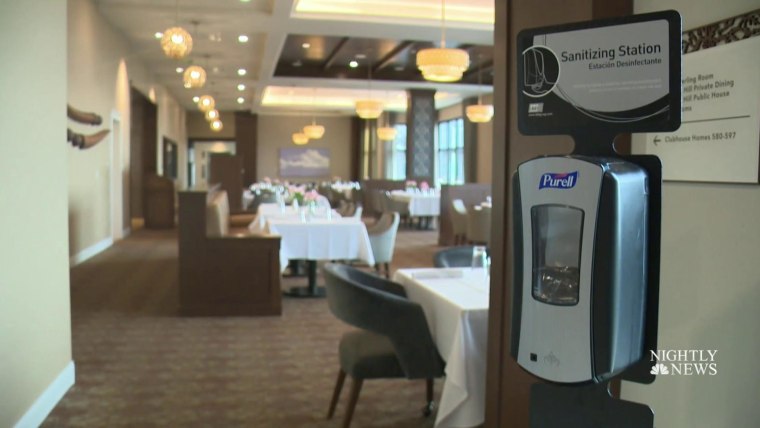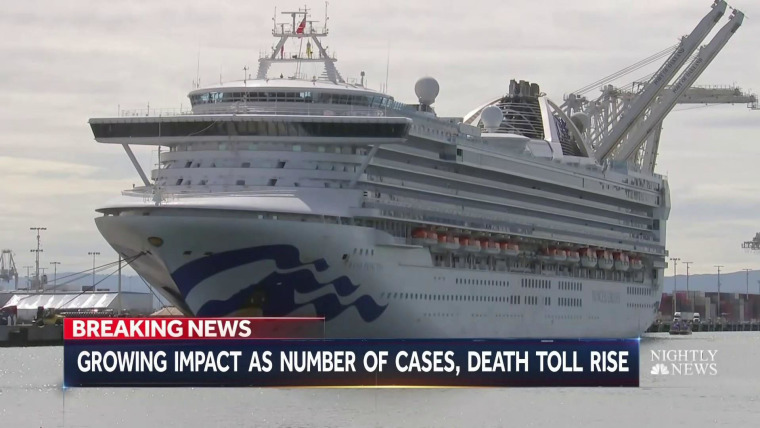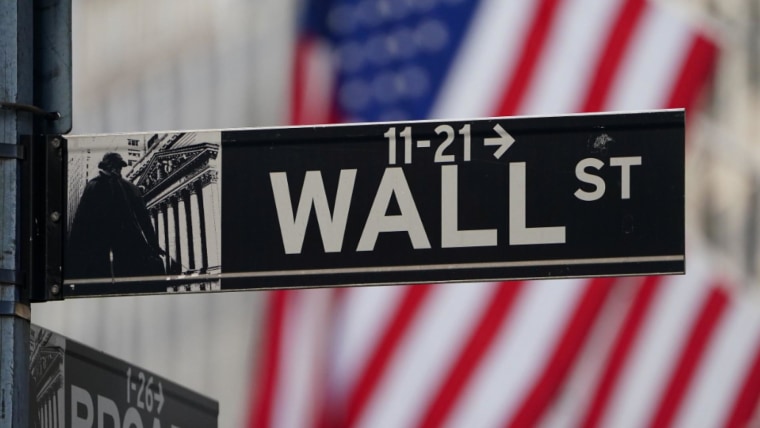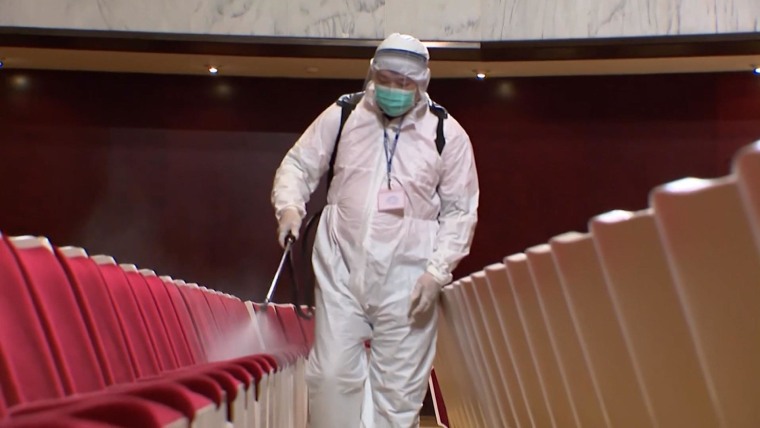What Taiwan can teach the world on fighting the coronavirus
TAIPEI, Taiwan — As countries around the world grapple with the coronavirus, Taiwan may offer valuable lessons on how to curb its spread.
Just 81 miles away, the island is a short flight to mainland China, where COVID-19 is believed to have originated in the city of Wuhan. As the outbreak took hold in January, many Taiwanese business people and their families based in China were returning to celebrate the Lunar New Year, and up to 2,000 Chinese tourists a day visited the island, potentially bringing the virus with them.
And yet, Taiwan has had only 47 cases of COVID-19 and one death as of Tuesday — far fewer than China’s 80,754 cases and 3,136 deaths, a stark contrast even when taking into account the enormous population difference: Taiwan’s 23 million to China’s 1.4 billion. Taiwan’s numbers are also much lower than neighboring countries such as South Korea, which has had more than 7,500 cases, and Japan, with 530. It’s also faring better than countries much farther away from China, such as Italy, with more than 9,000 cases, and the United States, which has over 700.
So what can Taiwan teach the world so other countries can stem the spread of the virus?
Stock futures hint at market surge after worst day since financial crisis
Stock futures rallied early Tuesday morning after the S&P 500′s worst day since the financial crisis.
Around 5:30 a.m. ET Tuesday, futures on the Dow Jones Industrial Average indicated an opening surged of more than 1,000 points on Tuesday. S&P 500 futures and Nasdaq-100 futures also pointed to a sharply higher open for the two indexes on Tuesday.
Stock futures erased big losses and turned positive after President Donald Trump floated the idea of “a payroll tax cut or relief” to offset the negative impact from the coronavirus. The potential tax incentives come on top of an $8.3 billion spending package Trump signed last month.
Oil jumps 5 percent after rout on stimulus hopes, slowing virus in China
Oil prices jumped by five percent Tuesday after the biggest one-day rout in nearly 30 years, as investors eyed the possibility of economic stimulus, although early gains were pared on demand concerns over the global spread of the coronavirus.
Brent crude futures rose by $1.76, or 5.1 percent, to $36.12 a barrel by Tuesday early morning, paring back earlier gains that saw prices touch a session-high of $37.38 a barrel.
Both benchmarks plunged 25 percent on Monday, dropping to their lowest since February 2016 and recording their biggest one-day percentage declines since Jan. 17, 1991, when oil prices fell at the outset of the first Gulf War.
President Donald Trump on Monday said he will be taking “major” steps to gird the U.S. economy against the impact of the spreading coronavirus outbreak, while Japan’s government plans to spend more than $4 billion in a second package of steps to cope with fallout from the virus.
Growing number of universities cancel face-to-face instruction
A growing number of colleges, including The Ohio State University and San Francisco State University, have suspended face-to-face classes amid fears of growing coronavirus cases in the United States.
OSU in a statement noted that while there are no campus-associated cases of COVID-19, “we know that there are at least three confirmed cases in the state of Ohio, and we expect that there will be more.” It is suspending face-to-face instruction and moving to virtual interactions through at least March 30.
San Francisco State said that all face-to-face courses will be suspended, but the campus is not being closed. The city and county of San Francisco on Thursday announced two presumptive positive cases. UC San Diego said Monday that starting in Spring Quarter all lecture and discussion courses will be delivered remotely. UC Berkeley said starting Tuesday it is suspending most in-person classes and will be offering classes remotely.
Rice University in Houston this week announced in-person instruction is canceled this week and it is preparing for the possibility of delivering most of its classes remotely. Princeton said Monday that it will move to virtual instruction after spring break and will decrease the number of gatherings on campus. Stanford also said it will move in-person classes to an online format for the last two weeks of winter quarter.
‘Jeopardy!’ and ‘Wheel of Fortune’ won’t tape in front of audiences over coronavirus fears
Game shows “Jeopardy!” and “Wheel of Fortune” will not tape in front of studio audiences amid the spread of coronavirus, a source close to the shows told NBC News.
The Centers for Disease Control and Prevention says on its website that “social distancing” is one way to help prevent the spread of the coronavirus and the illness it causes, COVID-19, in communities.
Santa Clara County, California, banned mass gatherings of more than 1,000 people in an effort to prevent transmission, officials said Monday.
California’s Santa Clara County bans gatherings with more than 1,000 people
Santa Clara County, California, public health officials, citing an increase in the number of coronavirus cases that could be community spread, announced an order banning gatherings of more than 1,000 people for three weeks.
The order does not apply to airports, offices, grocery stores or shopping malls. But it could affect the San Jose Sharks hockey team, which said in a statement Monday night that it was aware of the new guidelines and would adhere to them.
Xi makes first visit since outbreak to China’s epicenter Wuhan
BEIJING — President Xi Jinping visited China’s virus epicenter Tuesday for the first time since cases of a then-unidentified respiratory illness emerged in the city of Wuhan in December.
The visit came as people gradually began to return to work in other parts of China while the virus spreads to most of the world, seriously impacting travel, markets and the global economy. He is expected to inspect epidemic prevention and control work and visit medical workers, community volunteers, patients and others on the front lines.
The disease’s spread in China cast scrutiny on Xi’s leadership, as he was conspicuously absent from the public eye during the early days of the crisis. Initial failures to react quickly were pegged on municipal and provincial-level officials who have since been replaced.
State media reported Xi arrived in the morning in Wuhan, which has been under lockdown along with several nearby cities since late January in a disease-containment measure. The city has the bulk of the country’s more than 80,000 confirmed cases, and authorities sent thousands of medical workers and built several prefabricated isolation wards to deal with its mass of COVID-19 patients.
SXSW lets go third of staff after cancellation because of coronavirus
Organizers for the South by Southwest annual conference, which was canceled by Austin officials over coronavirus fears, said Monday that they had let go of about one-third of its full-time staff.
“Due to the City of Austin’s unprecedented and unexpected cancellation of the SXSW 2020 events in March, SXSW has been rigorously reviewing our operations, and we are in the unimaginable position of reducing our workforce. Today we said goodbye to approximately one-third of our full-time staff,” a spokesperson for South by Southwest, commonly known as SXSW, said.
“Those of us in the business of live events know the level of trust required to execute an event of SXSW’s scale, and we are deeply sad to let people go this soon. We are planning for the future and this was a necessary, but heartbreaking step,” the spokesperson said.
Austin’s mayor on Friday declared a state of emergency, which resulted in the cancellation.















